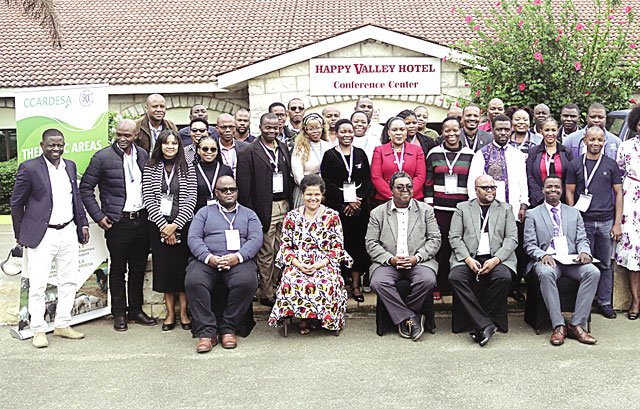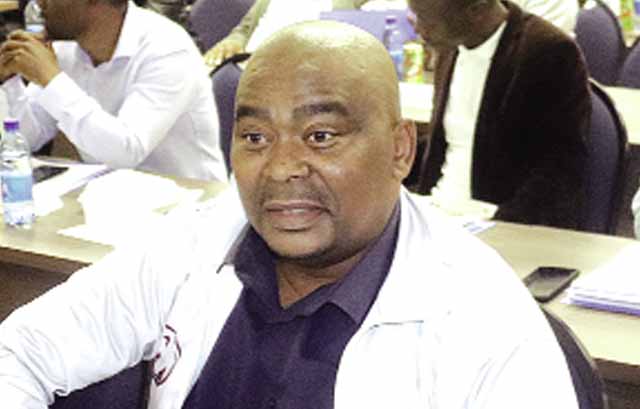By NOMFANELO MAZIYA | 2024-04-21

Eswatini along with many other African nations is under scrutiny for failing to meet its commitment to increase investment in agriculture under the Malabo Declaration.
The Malabo Declaration, formally called the Malabo Declaration on Accelerated Agricultural Growth and Transformation for Shared Prosperity and Improved Livelihoods, is a commitment made by African Union member States in 2014.
It outlines a set of goals for achieving agricultural transformation and food security in the continent by 2025.
The country’s struggle to meet its investment targets in agriculture was highlighted by Southern African Development Community’s (SADC) Duncan Samikwa during his address at the opening of the three-day National Knowledge Management Workshop at Happy Valley yesterday.
The Malabo Declaration commits African countries to allocating at least 10 per cent of their national budgets to agriculture, aiming for 6 per cent annual growth in the sector.
"Despite these commitments, many nations, including Eswatini, have yet to meet these targets consistently," said Samikwa.
The shortfall, according to Samikwa, goes beyond simple budgetary allocation. "This is a reflection of deeper systemic issues that need our urgent attention," he stated. The workshop also shed light on challenges with data collection in tracking progress towards the Malabo commitments. "The implementation of CAADP and the tracking of Malabo commitments reveal a significant gap in our data collection processes," Samikwa observed. He said inaccurate or incomplete data hindered effective policymaking, according to the SADC representative.
"The lack of robust data leads to policy decisions that are not grounded in the current realities of our agricultural sectors, thereby diminishing the effectiveness of our interventions," he explained. Samikwa further emphasised the importance of knowledge management and technology transfer for agricultural development.
He commended the Centre for Coordination of Agricultural Research and Development for Southern Africa (CCARDESA) for its efforts in coordinating research and disseminating technologies across the region.
However, he stressed, "The efforts by CCARDESA, governments and other stakeholders are by no means adequate to achieve the 6 per cent annual growth rate."
While welcoming participants to a workshop on Knowledge Management and Monitoring of Malabo Commitments, Ministry of Agriculture Principal Secretary Sydney Simelane also acknowledged the challenges faced in meeting pledged investment targets. "We must recognise that despite our efforts, Eswatini, like many African nations, has yet to fully achieve all the Malabo Declaration targets," he conceded.
Eswatini shines as a leader in SADC's agricultural commitments
While acknowledging the overall challenges faced by many African nations in meeting the Malabo Declaration's goals, Southern African Development Community (SADC) representative Duncan Samikwa highlighted Eswatini's success story during a workshop on the Malabo Commitments.
"Eswatini's experience is a case in point," said Samikwa.
While acknowledging that the country hasn't yet achieved all targets, he lauds its performance.
"I wish to congratulate Eswatini for being one of the best performing in SADC."
Eswatini's strength lies in its progress on five out of the seven CAADP Malabo commitments.
These include upholding core CAADP principles, boosting agricultural investment, striving to halve poverty by 2025, building resilience to climate change, and fostering mutual accountability. “Eswatini has done well and is progressing well including Commitment 1 of unfolding CAADP principles, 2,- enhancing Investment Finance in Agriculture, 3 - halving poverty by 2025, 6- resilience to climate change and 7- enhancing mutual accountability in both CAADPO Biennial Review 3 and CAADP Biennial Review 4,” said Samikwa.
This achievement underscores the importance of a collaborative approach, according to Samikwa.
"The necessity for a more integrated approach involving all stakeholders is crucial, emphasises Samikwa. Governments, regional bodies, private enterprises and civil society organisations working together can share information and resources more effectively. To build upon this success and propel the entire SADC region forward, Samikwa proposes three key actions:
He recommended implementing robust data collection mechanisms will ensure reliable and detailed information for accurate monitoring and informed decision-making.
He further proposed improved knowledge management systems. “Sharing best practices, not just within countries but across the region, leveraging platforms like CCARDESA, will foster regional cooperation and accelerate progress,” said Samikwa. Samikwa also emphasised that data-driven and knowledge-based approaches are not simply beneficial, ‘they are essential for sustainable development.’
Agriculture eyes gradual increase in budgetary allocation
Despite falling short of the Malabo Declaration's 10 per cent target, the ministry of agriculture remains optimistic.
Principal Secretary Sydney Simelane expressed faith in the new cabinet's commitment to ‘Nkwe’ (diligence) as outlined by His Majesty King Mswati III during the opening of the 12th Parliament. Simelane believes that this commitment will lead to a gradual increase in resources allocated to agriculture. “The current allocation of 5.2 per cent of public spending to agriculture is a cause for concern, considering the Malabo Declaration's goals,” said Simelane. He emphasises the importance of agriculture, highlighting its vulnerability to climate change and its ripple effect on other sectors like health in case of food insecurity.
“Agriculture will be the first to be impacted by climate change, affecting food security. Climate change will have a domino effect because following suite will be health as without food security people will become malnourished, and the effects will continue to spill on,” he said.
However, Simelane emphasised the importance of knowledge management as a key driver for progress.
He outlined the significant benefits of effective knowledge management in the agricultural sector:
Simelane said utilising data and insights allowed for informed choices based on evidence, leading to more effective and efficient processes.
knowledge
He said knowledge management facilitated capturing and sharing past experiences, enabling stakeholders to build upon successes and avoid repeating mistakes.
The PS further stated that sharing information and expertise fostered collaboration and communication among all actors in the agricultural value chain, leading to more holistic solutions.
“Access to timely information empowers stakeholders to identify risks, anticipate challenges and develop contingency plans, enhancing resilience,” he said.
Simelane underscored the dire need for policy formulation and implementation. He said knowledge management provided the evidence base for sound policies and supports monitoring and evaluation for continuous improvement. Simelane also advocated for capacity building and empowerment. “By providing access to training and resources, knowledge management empowers individuals and organisations to make informed decisions and drive positive change,” he said. He highlighted the workshop's role in equipping participants with the skills needed to leverage knowledge management practices.
By prioritising these practices, he emphasised, the agricultural sector could achieve greater efficiency, resilience and sustainability.
Simelane then outlined key aspects of the Declaration, including increased investment in agriculture, eradicating hunger by 2025, boosting intra-African trade in agricultural products, building resilience to climate change as well as strengthening agricultural research and innovation.
He emphasised the importance of monitoring and reporting on these commitments for tracking progress and fostering accountability.
“Strengthening these capabilities is crucial for evaluating policies and interventions and accelerating progress towards achieving the Malabo goals,” said Simelane.
share story
Post Your Comments Below

SOCCER - BOYS will be separated from men when the 2024 Premier League of Eswatini (PLE) elections...

Two pedestrians passed away tragically after being knocked down by a motor vehicle whose driver w...

The Central Bank of Eswatini (CBE) has announced a surprising E3.6 billion increase in the countr...

SOUTH African amapiano sensation Aymos set the stage on fire and shut the 8th edition of Embiveni...
All material © Swazi Observer. Material may not be published or reproduced in any form without prior written permission.
Design by Real Image Internet